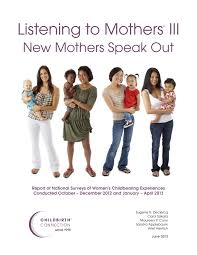 Last week we shared some highlights from the information-packed Listening to Mothers survey on the pregnancy and birth experiences of 2,400 women who gave birth between July 1, 2011 and June 20, 2012. You can find that post (with more on the Listening to Mothers intiative) here. This week, we’ve outlined survey results related to the postpartum period including breastfeeding from Listening to Mothers III and the follow-up New Mothers Speak Out survey. You can find both reports on the Childbirth Connection website.
Last week we shared some highlights from the information-packed Listening to Mothers survey on the pregnancy and birth experiences of 2,400 women who gave birth between July 1, 2011 and June 20, 2012. You can find that post (with more on the Listening to Mothers intiative) here. This week, we’ve outlined survey results related to the postpartum period including breastfeeding from Listening to Mothers III and the follow-up New Mothers Speak Out survey. You can find both reports on the Childbirth Connection website.
Breastfeeding and Postpartum (Listening to Mothers III)
While most mothers (66%) felt the hospital staff encouraged breastfeeding, those who planned to exclusively breastfeed reported being offered formula or given samples (49%) and their babies were given pacifiers (37%) or formula or water supplementation (29%) while in the hospital. A birth plan that includes breastfeeding support requests can go a long way to reduce these experiences for our nursing clients.
Less than 10% of survey participants said they were “usually” or “always” treated poorly in the hospital because of their race, insurance coverage or because they had a difference of opinion with their care provider. Doulas must be sensitive to the reasons clients may not receive positive, supportive or compassionate treatment by hospital staff and serve as a sounding board, resource and support for self-advocacy in these situations.
Postpartum pain that interfered with routine activities was reported more often by women who had a cesarean birth (26%) than by those who had a vaginal birth (9%). For those who gave birth more than six months before completing the survey, 16% reported on-going pain from a cesarean. For those who birthed vaginally, 11% still had urinary issues and 7% continuing perineal pain. While we can’t know from this data why these mothers experienced postpartum pain and complications for this duration, educating clients on what to expect in terms of their recovery and providing resources (i.e. acupuncture, pelvic floor specialists, etc.) may help our clients know when to seek help and where. Encouraging clients to give themselves time to recover from their births so that their bodies can heal and rejuvenate may also help lessen postpartum pain or other lingering conditions.
Twenty-two percent indicated they had discussed concerns regarding their emotional or mental well-being with a professional (health care of mental health) since having their baby. We know that postpartum depression is a significant issue for new mothers with serious impacts on them and their families. While awareness is increasing, doulas must continue to educate clients and their families regarding what is normal in the postpartum period and what is not, as well as provide resources for help when it is needed.
Postpartum (New Mothers Speak Out)
Sleep loss (58%), stress (54%), exhaustion (51%), sore nipples/breast tenderness (48%) , backache (46%), weight control (45%) and lack of sexual desire (43%) were reported as at least a minor problem for mothers in the first two months after birth. Knowing the most commonly cited problems for new mothers is valuable information for doulas so we can be prepared to provide support, information and resources to help our clients cope with the challenges they are most likely to face.
For those who birthed six months before or more, 34% said they were still feeling stressed, 30% still had issues with sleep and 29% reported challenges with weight control. Helping clients know what to expect in the months ahead, as well as support for stress management (which can contribute to both sleep and weight issues) may help clients care for themselves as they care for their newly expanded family.
Thirty-seven percent said that their own physical health interfered with their ability to care for their child at least “some” during their first eight weeks postpartum and 29% said their emotional health interfered at least “some” during that time period. This data underscores the importance of postpartum support for families. Relieving mothers of newborns of some of their household duties, encouraging rest, setting appropriate expectations for recovery and providing support during this important time of transition and healing go far to encourage mother-baby bonding, breastfeeding and getting a newly expanded family off to the best start possible.
Mothers who intended to breastfeed but were not one week after birth reported a range of reasons including that the baby had a hard time nursing (31%), breastfeeding was too difficult to get established (23%), convenience of formula (23%) and lack of support (17%). While breastfeeding rates have risen in recent years, mothers still face many barriers to successfully establishing breastfeeding. Early postpartum support by doulas can help new mothers overcome those barriers through education, encouragement and resource referrals.
The Listening to Mothers initiative is a powerful repository of information on the expectations and experiences of pregnancy, birth and the postpartum period by American mothers. Learn more about it here.

